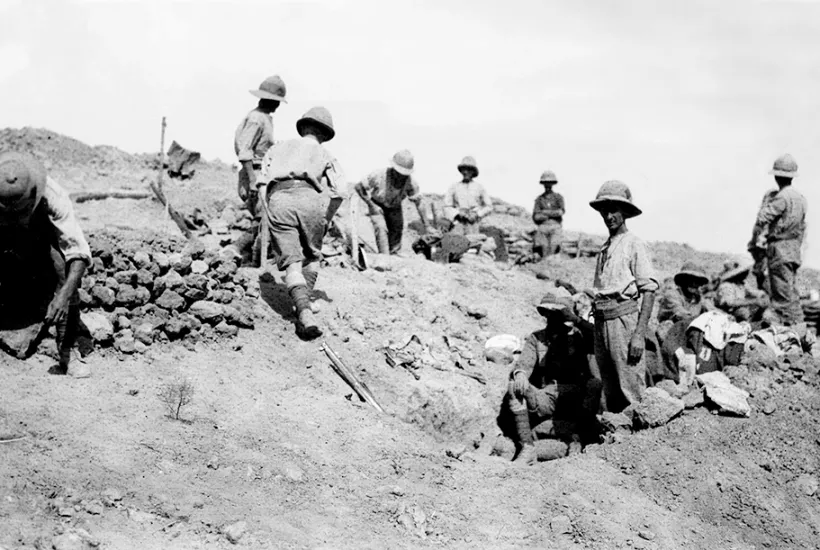December 1917. For years the Ottoman Turks have been trying to spark a worldwide jihad of the world’s Sunni Muslims, hoping that Muslim subjects of the British empire in India will rise in revolt.
Now that Tsarist power in Russia has collapsed, the roads through central Asia are open, and the war-weary British Empire has virtually no resources left to prevent the Turkish empire from expanding into India.
Edward Noel, An aristocratic Catholic political officer who is supposed to be in Persia, sends a telegram to his betters from Baku, an oil-producing city perched on the western shore of the Caspian Sea. He wants to plug the strategic gap in central Asia by raising a force of local troops. He deems it but an inconvenience that everyone around him is fighting everyone else to the point of pogrom.
Single-handedly reshaping the geopolitics of the Caspian Sea lands Noel into a world of trouble. Captured by Persian rebels, he is falsely accused of organising a massacre of Muslims, is tied to a tree, and faces a firing squad. He won’t confess, and at the last minute, a messenger arrives with a stay of execution.
Now Even Noel, “brave to the point of recklessness,” gets the message, and he slips away in the middle of the night, forcing his way through ten miles of dense, thorny, and waterlogged forest until his legs became a “bleeding pulp”. After 24 hours of continuous marching, he is recaptured, flogged, and kept in heavy chains in a vermin-infested hut. He keeps himself sane by reciting poetry and studying bugs.
Released after five months, he straight away asks to be reposted to Baku.
It would be a crabbed and bitter heart indeed that did not swell to such a tale of British pluck and fortitude. And the stirring stories come thick and fast, as former BBC correspondent Nick Higham narrates the six-week long Battle of Baku — arguably the least remembered battle of the First World War.
Thrilling and sardonic by turns, Mavericks weaves together the stories of half-a-dozen British imperial agents and adventurers as they furiously extemporise a future for the very edges of their overstretched empire. Higham is no pushover. He knows that his heroes are all raconteurs who tended to embellish their stories. He says he has checked their accounts against official archives wherever he can, but cheerfully concedes that “sometimes I strongly suspect they made stuff up”. He highlights inconsistencies and, so far as he can, traces how such different versions of the same story emerge: how field reports turn first into anecdotes and then into family myths. Factfulness can be lost in the process; but the light of hindsight encourages other truths to emerge.
Lionel Dunsterville, whose tiny British force defended Baku against the Turks, knew all about such matters. He was fast friends with Rudyard Kipling at the United Services College, and Kipling’s, “Stalky & Co.” stories were a lightly disguised account of their schoolboy adventures. Dunsterville spends his whole time in Baku, and elsewhere, having to live up to his fictional alter-ego: it hardly needs saying that he does so splendidly.
Ranald MacDonell, an oil executive turned spy and smuggler, and Reginald Teague-Jones, an intelligence officer who spent his life under an assumed name in fear of assassination, round out Higham’s cast. And over the lot of them, Baku casts its sticky shadow. In this opulent wreck of a city, the source of half the world’s oil, minute droplets of oil escape in clouds and slowly settle on everything, and constant well fires pump thick, choking smoke into the air. “The road to hell, I thought, would be very similar to the one we were driving on”, writes one Russian revolutionary correspondent. A more down-to-earth British soldier describes the place as one gigantic and very dirty garage.
Efforts to hold Baku against Ottoman forces culminated in the North Staffordshire Regiment’s last stand on ‘Dirty Volcano’, fighting with incredible bravery while the local Armenian volunteers they were supporting “stuck to their usual role of interested spectators” (as one embittered British general would have it). The picket on the very top of the hill was completely wiped out. ”We were obliged to kill them all,” one Turkish officer recalls.
And once the city falls to the Turks, the British have to evacuate. Lieutenant-Colonel Toby Rawlinson takes command of a steamer laden with high explosives, barricades the bridge with cases of dynamite, and warns his hostile crew that one stray bullet will blow them all to kingdom come…
Higham’s stories of British soldiers demonstrating immense bravery and commitment against overwhelming odds and in appalling conditions amount to an almost Palinesque pile-up of Imperial Virtues Worth Emulating.
“Empires are out of fashion nowadays,” Higham remarks, but, thank goodness, his reasonableness and intelligence prove more than a match for all our current post-colonial posturing. He’s no especial apologist for empire, but he knows that waiting for the end of empires would be like waiting for an end to the weather. And as for those who say there’s no such thing as a good imperialist, well these half-dozen lives suggest they’re wrong.

